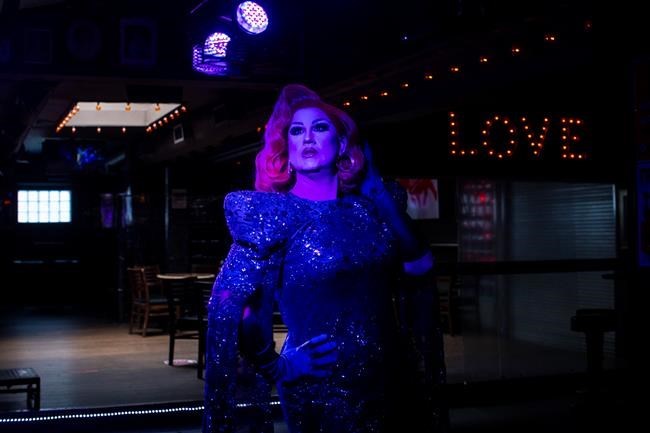
Drag Queen Miss Conception (aka Kevin Levesque) is photographed at Woody's, a club/bar in Toronto on Tuesday August 18, 2020. THE CANADIAN PRESS/Chris Young
August 19, 2020 - 1:00 AM
TORONTO - Kevin Levesque rarely hesitates to get his hands dirty working the crowds as drag queen Miss Conception, but when things got hairy this summer in the live entertainment world, the Toronto performer literally dug his heels into the mud.
Faced with the reality of gigs drying up due to the COVID-19 pandemic, Levesque did a quick pivot from indoor club queen to backyard superstar.
Borrowing a friend's RV camper, he hit the road with Miss Conception's trademark "costume change" performances, which showcase the queen tearing off one dazzling outfit to reveal another underneath. As many as eight costumes are layered over each other, running the gamut of female icons, from the Golden Girls to Peggy Bundy.
The first show on the 13-stop tour was booked by a couple who gathered their whole family in Cobourg, Ont. to witness the spectacle.
"We pulled right into the backyard, I set up the sound system and literally came right out of the RV, like Priscilla, Queen of the Desert," Levesque remembered.
"I did my Disney show and kept it all PG. It was just really great to see people smiling again."
Drag queens who innovate during the COVID slowdown will be the ones who find the greatest success, suggested Levesque. And after months of dejection for much of the drag community, Miss Conception's backyard shows may have offered a runway to the future.
Shortly after they wrapped earlier this summer, Levesque began drafting more grandiose plans to launch Miss Conception's Drive-in Drag Show tour at outdoor theatres across Ontario, with a lineup of veteran queens joining the bill. Once that's over, he's planning to go even bigger with a national drive-in tour that stretches from Newfoundland to British Columbia next year.
"A lot of drag queens were like, 'Meh, we're just gonna sit at home and grow a beard,'" he said of the early days of the virus.
"But I was like, 'No, I can't do this.' I mean, we live for the applause, like that quote from Lady Gaga's song."
Levesque is accustomed to the hustle of live entertainment, having worked for two decades in Canada's drag community. But he recognizes that COVID has thrown shade on many of his drag sisters who've lost regular paying gigs.
It wasn't supposed to be this way.
Heading into 2020, the country's drag scene seemed postured for a banner year. The debut season of Crave's competition series "Canada's Drag Race" was already shining a spotlight on homegrown performers, and the attention was radiating to others in the community who weren't even part of the "RuPaul's Drag Race" spinoff.
Some LGBTQ bars and restaurants were looking forward to a new generation of drag fans crowding into their establishments for "Canada's Drag Race" viewing parties. And many local queens hoped to capitalize on mainstream interest with paid appearances at community and corporate events over the summer.
But many of those dreams failed to materialize when physical distancing rules went into effect to reduce the spread of the novel coronavirus.
Jason Pelletier, who performs as Jezebel Bardot, was among those who had rosy hopes for a blockbuster year.
In the weeks before the pandemic shut-down, he shot a music video with Calgary-based country music quartet Nice Horse, giving the ladies a makeover to the tune of their single "Hot Mess." Trixie Mattel, a favourite on "RuPaul's Drag Race," dipped in for a cameo, making it certain the clip would be seen beyond Canada.
"I remember in February and March thinking this is the year — things are finally rolling in," Pelletier said.
"And when March hit it was all downhill."
Few queens felt the pandemic's fallout quite like the cast of "Canada's Drag Race," who were eagerly awaiting the show's debut in July. With episodes available on Crave nationwide, and internationally in the United States, the United Kingdom, and other countries, the global exposure was unprecedented.
When Sheldon McIntosh learned his persona Tynomi Banks was selected as one of the competitors, he knew his schedule would quickly fill up with meet-and-greets and club appearances.
"Me and my sisters were on the edge of our seats," McIntosh explained.
"But when COVID hit, honestly, we were just devastated. There was an overwhelming sense of loss."
Live performances were cancelled and major drag conventions postponed, leaving many of the queens to wonder if their stunning new outfits would even leave the closet.
McIntosh said after several weeks of sadness, he followed the lead of other popular queens by taking Tynomi Banks online for live performances.
"I use the living room where we have this long wall," he said. "Thank the Lord we bought a big black curtain... so it looks like a makeshift stage."
Slowly, some of Canada's LGBTQ-friendly venues are now reopening and booking performers on their patios and indoor stages.
But as winter looms so do questions about a second wave of the virus sending everyone back into isolation.
Devion Farley, known on stage as Devine Darlin, said those uncertainties were crippling in the early stages of COVID. After his tours in Europe and Mexico were cancelled, he slipped into a depression. It wasn't until a local food delivery service contacted him about pairing up for a cooking show that his creativity started to flourish again.
Every week, Darlin would appear on Instagram Live when a mystery meal kit arrived at her doorstep. The challenge was to make a delicious dish from the ingredients inside the box.
"I like to cook and I like to eat," Farley said.
"It's something that people don't see me do, so I wanted to welcome them into my kitchen and let them see the fun I have."
This report by The Canadian Press was first published Aug. 19, 2020.
Follow @dfriend on Twitter.
News from © The Canadian Press, 2020